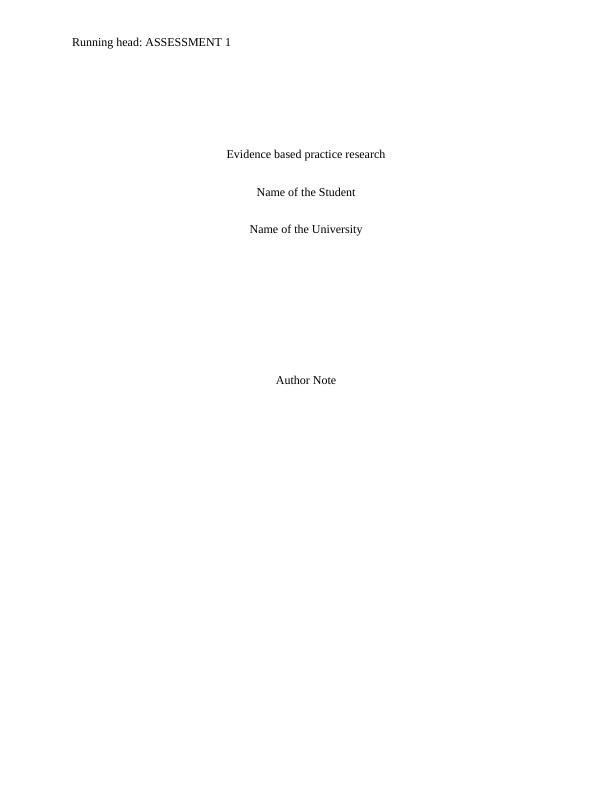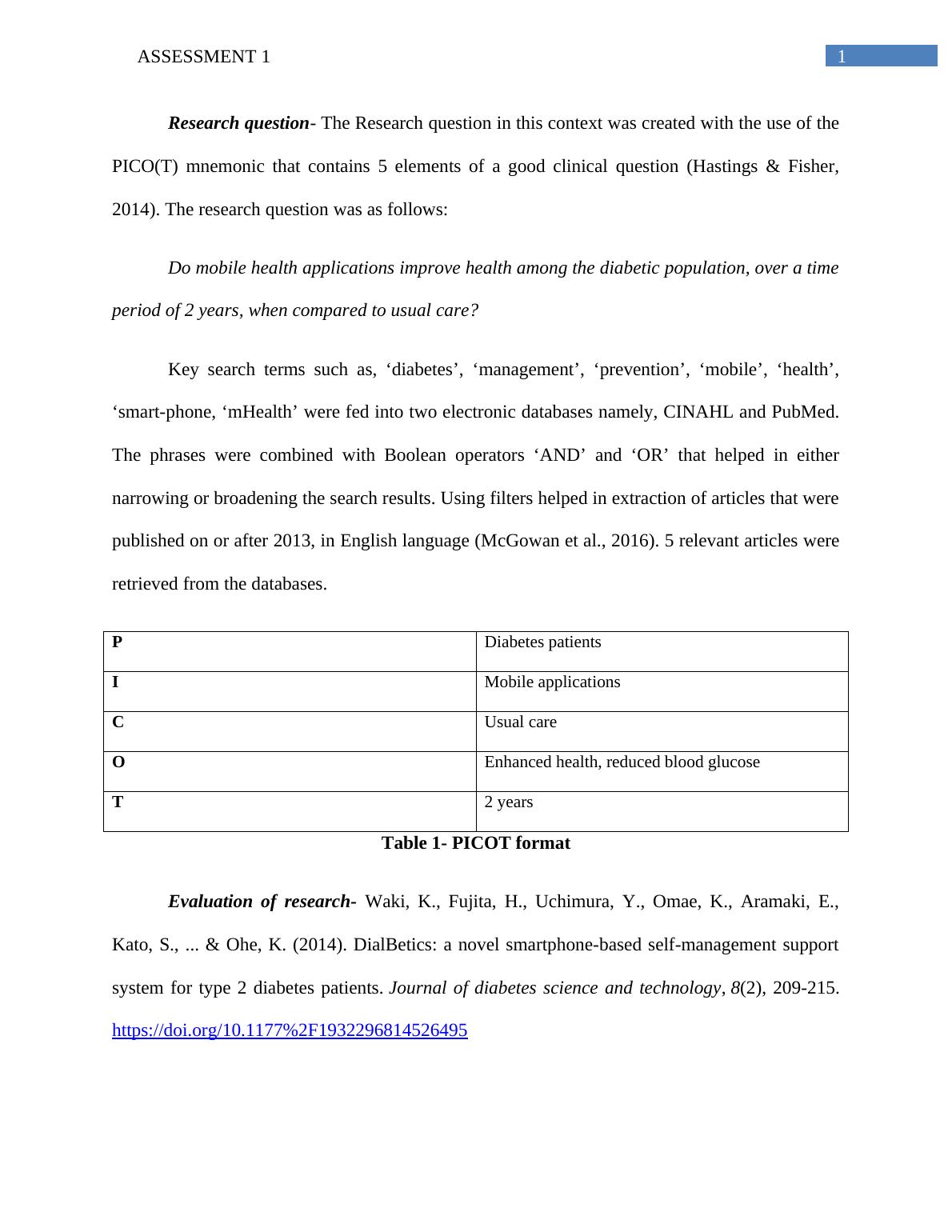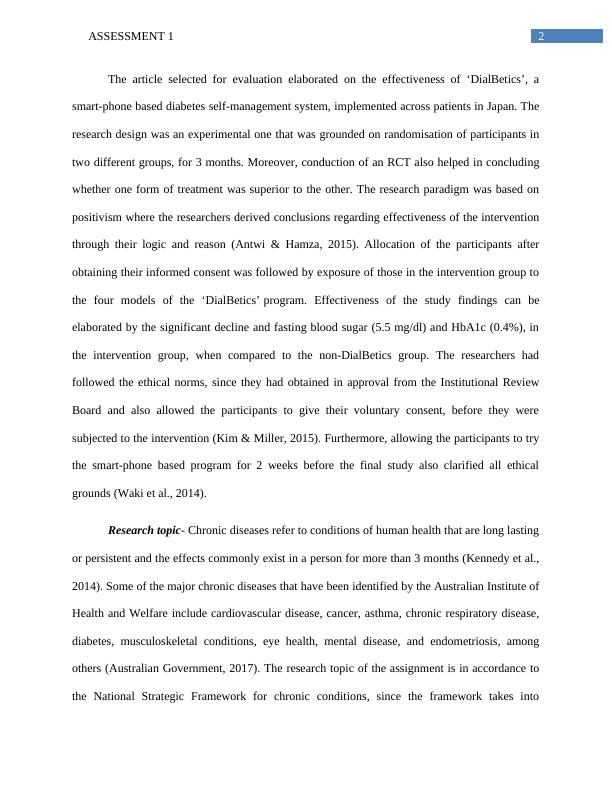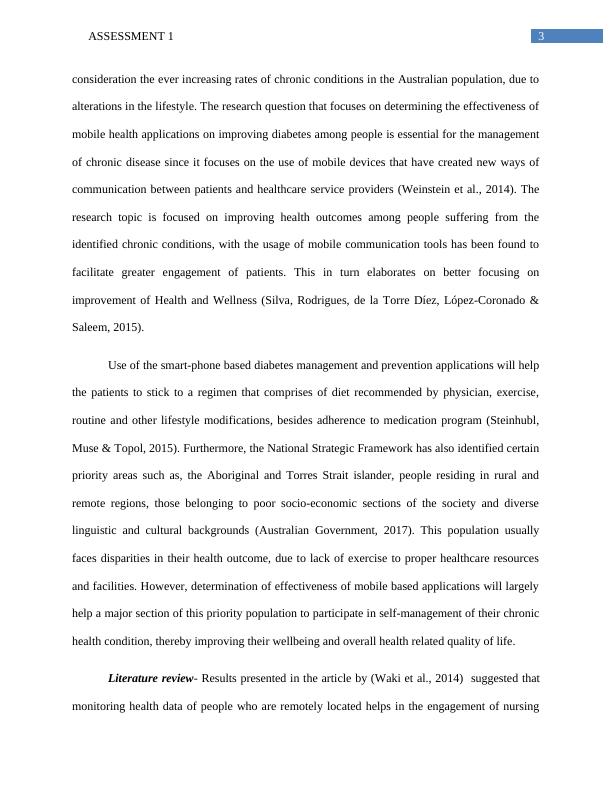Effectiveness of Mobile Health Applications on Diabetes Management
Added on 2023-06-05
14 Pages3719 Words195 Views
Running head: ASSESSMENT 1
Evidence based practice research
Name of the Student
Name of the University
Author Note
Evidence based practice research
Name of the Student
Name of the University
Author Note

1ASSESSMENT 1
Research question- The Research question in this context was created with the use of the
PICO(T) mnemonic that contains 5 elements of a good clinical question (Hastings & Fisher,
2014). The research question was as follows:
Do mobile health applications improve health among the diabetic population, over a time
period of 2 years, when compared to usual care?
Key search terms such as, ‘diabetes’, ‘management’, ‘prevention’, ‘mobile’, ‘health’,
‘smart-phone, ‘mHealth’ were fed into two electronic databases namely, CINAHL and PubMed.
The phrases were combined with Boolean operators ‘AND’ and ‘OR’ that helped in either
narrowing or broadening the search results. Using filters helped in extraction of articles that were
published on or after 2013, in English language (McGowan et al., 2016). 5 relevant articles were
retrieved from the databases.
P Diabetes patients
I Mobile applications
C Usual care
O Enhanced health, reduced blood glucose
T 2 years
Table 1- PICOT format
Evaluation of research- Waki, K., Fujita, H., Uchimura, Y., Omae, K., Aramaki, E.,
Kato, S., ... & Ohe, K. (2014). DialBetics: a novel smartphone-based self-management support
system for type 2 diabetes patients. Journal of diabetes science and technology, 8(2), 209-215.
https://doi.org/10.1177%2F1932296814526495
Research question- The Research question in this context was created with the use of the
PICO(T) mnemonic that contains 5 elements of a good clinical question (Hastings & Fisher,
2014). The research question was as follows:
Do mobile health applications improve health among the diabetic population, over a time
period of 2 years, when compared to usual care?
Key search terms such as, ‘diabetes’, ‘management’, ‘prevention’, ‘mobile’, ‘health’,
‘smart-phone, ‘mHealth’ were fed into two electronic databases namely, CINAHL and PubMed.
The phrases were combined with Boolean operators ‘AND’ and ‘OR’ that helped in either
narrowing or broadening the search results. Using filters helped in extraction of articles that were
published on or after 2013, in English language (McGowan et al., 2016). 5 relevant articles were
retrieved from the databases.
P Diabetes patients
I Mobile applications
C Usual care
O Enhanced health, reduced blood glucose
T 2 years
Table 1- PICOT format
Evaluation of research- Waki, K., Fujita, H., Uchimura, Y., Omae, K., Aramaki, E.,
Kato, S., ... & Ohe, K. (2014). DialBetics: a novel smartphone-based self-management support
system for type 2 diabetes patients. Journal of diabetes science and technology, 8(2), 209-215.
https://doi.org/10.1177%2F1932296814526495

2ASSESSMENT 1
The article selected for evaluation elaborated on the effectiveness of ‘DialBetics’, a
smart-phone based diabetes self-management system, implemented across patients in Japan. The
research design was an experimental one that was grounded on randomisation of participants in
two different groups, for 3 months. Moreover, conduction of an RCT also helped in concluding
whether one form of treatment was superior to the other. The research paradigm was based on
positivism where the researchers derived conclusions regarding effectiveness of the intervention
through their logic and reason (Antwi & Hamza, 2015). Allocation of the participants after
obtaining their informed consent was followed by exposure of those in the intervention group to
the four models of the ‘DialBetics’ program. Effectiveness of the study findings can be
elaborated by the significant decline and fasting blood sugar (5.5 mg/dl) and HbA1c (0.4%), in
the intervention group, when compared to the non-DialBetics group. The researchers had
followed the ethical norms, since they had obtained in approval from the Institutional Review
Board and also allowed the participants to give their voluntary consent, before they were
subjected to the intervention (Kim & Miller, 2015). Furthermore, allowing the participants to try
the smart-phone based program for 2 weeks before the final study also clarified all ethical
grounds (Waki et al., 2014).
Research topic- Chronic diseases refer to conditions of human health that are long lasting
or persistent and the effects commonly exist in a person for more than 3 months (Kennedy et al.,
2014). Some of the major chronic diseases that have been identified by the Australian Institute of
Health and Welfare include cardiovascular disease, cancer, asthma, chronic respiratory disease,
diabetes, musculoskeletal conditions, eye health, mental disease, and endometriosis, among
others (Australian Government, 2017). The research topic of the assignment is in accordance to
the National Strategic Framework for chronic conditions, since the framework takes into
The article selected for evaluation elaborated on the effectiveness of ‘DialBetics’, a
smart-phone based diabetes self-management system, implemented across patients in Japan. The
research design was an experimental one that was grounded on randomisation of participants in
two different groups, for 3 months. Moreover, conduction of an RCT also helped in concluding
whether one form of treatment was superior to the other. The research paradigm was based on
positivism where the researchers derived conclusions regarding effectiveness of the intervention
through their logic and reason (Antwi & Hamza, 2015). Allocation of the participants after
obtaining their informed consent was followed by exposure of those in the intervention group to
the four models of the ‘DialBetics’ program. Effectiveness of the study findings can be
elaborated by the significant decline and fasting blood sugar (5.5 mg/dl) and HbA1c (0.4%), in
the intervention group, when compared to the non-DialBetics group. The researchers had
followed the ethical norms, since they had obtained in approval from the Institutional Review
Board and also allowed the participants to give their voluntary consent, before they were
subjected to the intervention (Kim & Miller, 2015). Furthermore, allowing the participants to try
the smart-phone based program for 2 weeks before the final study also clarified all ethical
grounds (Waki et al., 2014).
Research topic- Chronic diseases refer to conditions of human health that are long lasting
or persistent and the effects commonly exist in a person for more than 3 months (Kennedy et al.,
2014). Some of the major chronic diseases that have been identified by the Australian Institute of
Health and Welfare include cardiovascular disease, cancer, asthma, chronic respiratory disease,
diabetes, musculoskeletal conditions, eye health, mental disease, and endometriosis, among
others (Australian Government, 2017). The research topic of the assignment is in accordance to
the National Strategic Framework for chronic conditions, since the framework takes into

3ASSESSMENT 1
consideration the ever increasing rates of chronic conditions in the Australian population, due to
alterations in the lifestyle. The research question that focuses on determining the effectiveness of
mobile health applications on improving diabetes among people is essential for the management
of chronic disease since it focuses on the use of mobile devices that have created new ways of
communication between patients and healthcare service providers (Weinstein et al., 2014). The
research topic is focused on improving health outcomes among people suffering from the
identified chronic conditions, with the usage of mobile communication tools has been found to
facilitate greater engagement of patients. This in turn elaborates on better focusing on
improvement of Health and Wellness (Silva, Rodrigues, de la Torre Díez, López-Coronado &
Saleem, 2015).
Use of the smart-phone based diabetes management and prevention applications will help
the patients to stick to a regimen that comprises of diet recommended by physician, exercise,
routine and other lifestyle modifications, besides adherence to medication program (Steinhubl,
Muse & Topol, 2015). Furthermore, the National Strategic Framework has also identified certain
priority areas such as, the Aboriginal and Torres Strait islander, people residing in rural and
remote regions, those belonging to poor socio-economic sections of the society and diverse
linguistic and cultural backgrounds (Australian Government, 2017). This population usually
faces disparities in their health outcome, due to lack of exercise to proper healthcare resources
and facilities. However, determination of effectiveness of mobile based applications will largely
help a major section of this priority population to participate in self-management of their chronic
health condition, thereby improving their wellbeing and overall health related quality of life.
Literature review- Results presented in the article by (Waki et al., 2014) suggested that
monitoring health data of people who are remotely located helps in the engagement of nursing
consideration the ever increasing rates of chronic conditions in the Australian population, due to
alterations in the lifestyle. The research question that focuses on determining the effectiveness of
mobile health applications on improving diabetes among people is essential for the management
of chronic disease since it focuses on the use of mobile devices that have created new ways of
communication between patients and healthcare service providers (Weinstein et al., 2014). The
research topic is focused on improving health outcomes among people suffering from the
identified chronic conditions, with the usage of mobile communication tools has been found to
facilitate greater engagement of patients. This in turn elaborates on better focusing on
improvement of Health and Wellness (Silva, Rodrigues, de la Torre Díez, López-Coronado &
Saleem, 2015).
Use of the smart-phone based diabetes management and prevention applications will help
the patients to stick to a regimen that comprises of diet recommended by physician, exercise,
routine and other lifestyle modifications, besides adherence to medication program (Steinhubl,
Muse & Topol, 2015). Furthermore, the National Strategic Framework has also identified certain
priority areas such as, the Aboriginal and Torres Strait islander, people residing in rural and
remote regions, those belonging to poor socio-economic sections of the society and diverse
linguistic and cultural backgrounds (Australian Government, 2017). This population usually
faces disparities in their health outcome, due to lack of exercise to proper healthcare resources
and facilities. However, determination of effectiveness of mobile based applications will largely
help a major section of this priority population to participate in self-management of their chronic
health condition, thereby improving their wellbeing and overall health related quality of life.
Literature review- Results presented in the article by (Waki et al., 2014) suggested that
monitoring health data of people who are remotely located helps in the engagement of nursing

End of preview
Want to access all the pages? Upload your documents or become a member.
Related Documents
Honey Dressing for Wound Healing in Diabetic Patients: A PICO(t) Analysislg...
|23
|2202
|374
A Systematic Review of mHealth Effectiveness on Improving Health Outcome of Diabetic Patientslg...
|1
|1064
|468
Increased Self-Care Activities and Glycemic Control Rate in Relation to Health Education via Wechat Among Diabetes Patients: A Randomized Clinical Triallg...
|12
|3843
|20
Effectiveness of Educational Programs for Chronic Kidney Disease Patientslg...
|10
|2609
|389
Effectiveness of Self-Management Interventions for Diabeteslg...
|14
|2152
|60
Health Intervention for Asthma Management Essaylg...
|12
|3594
|47
